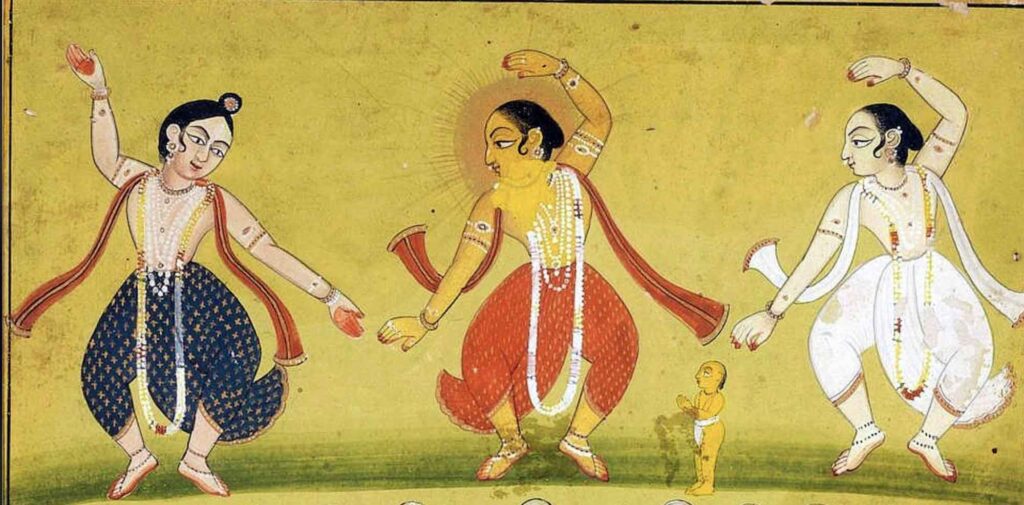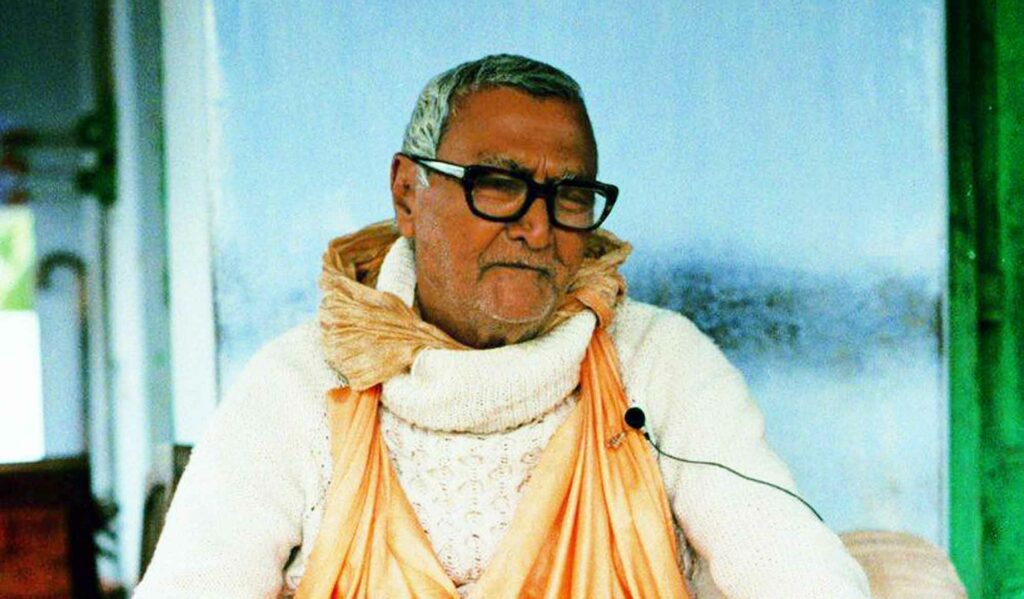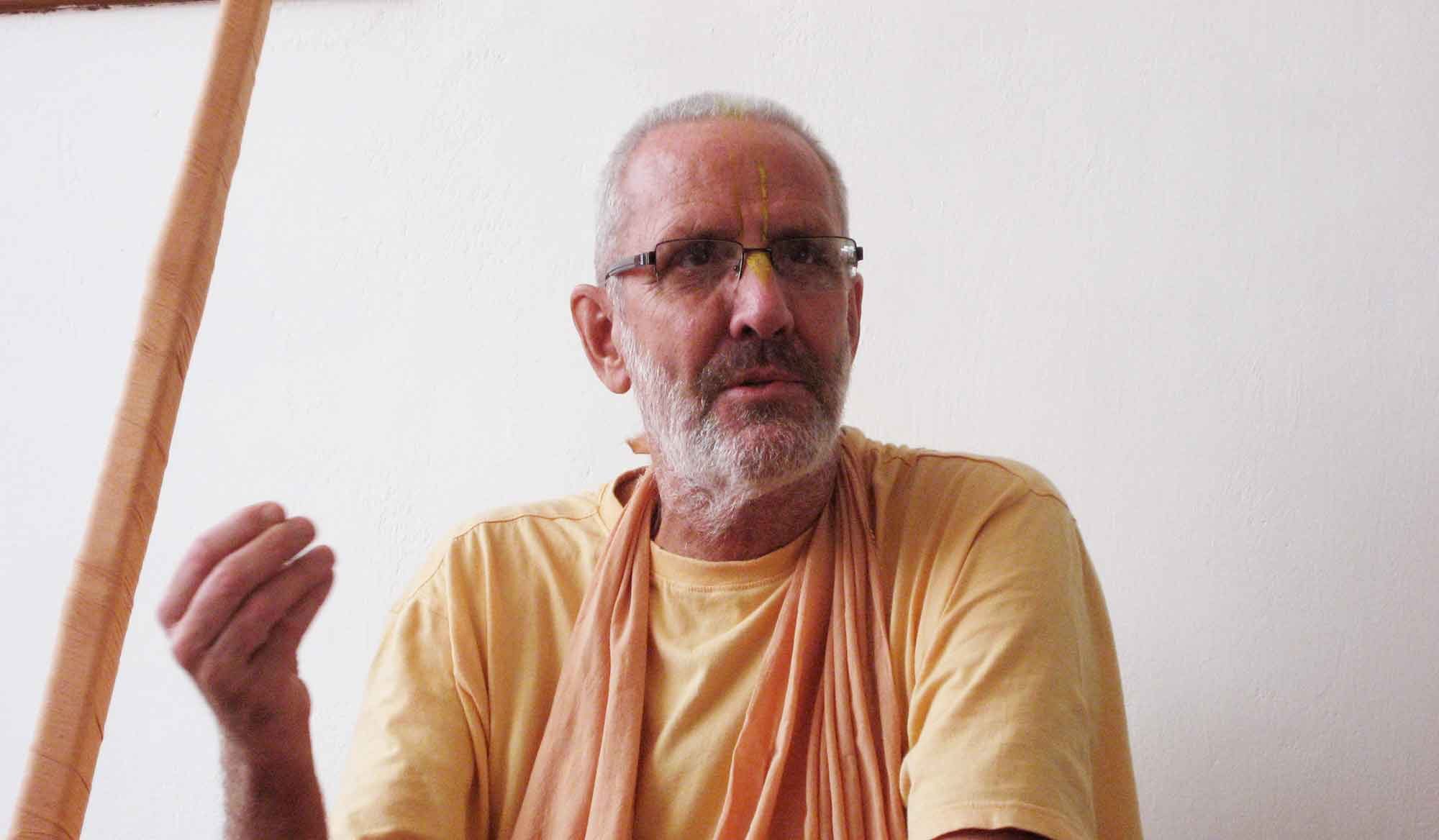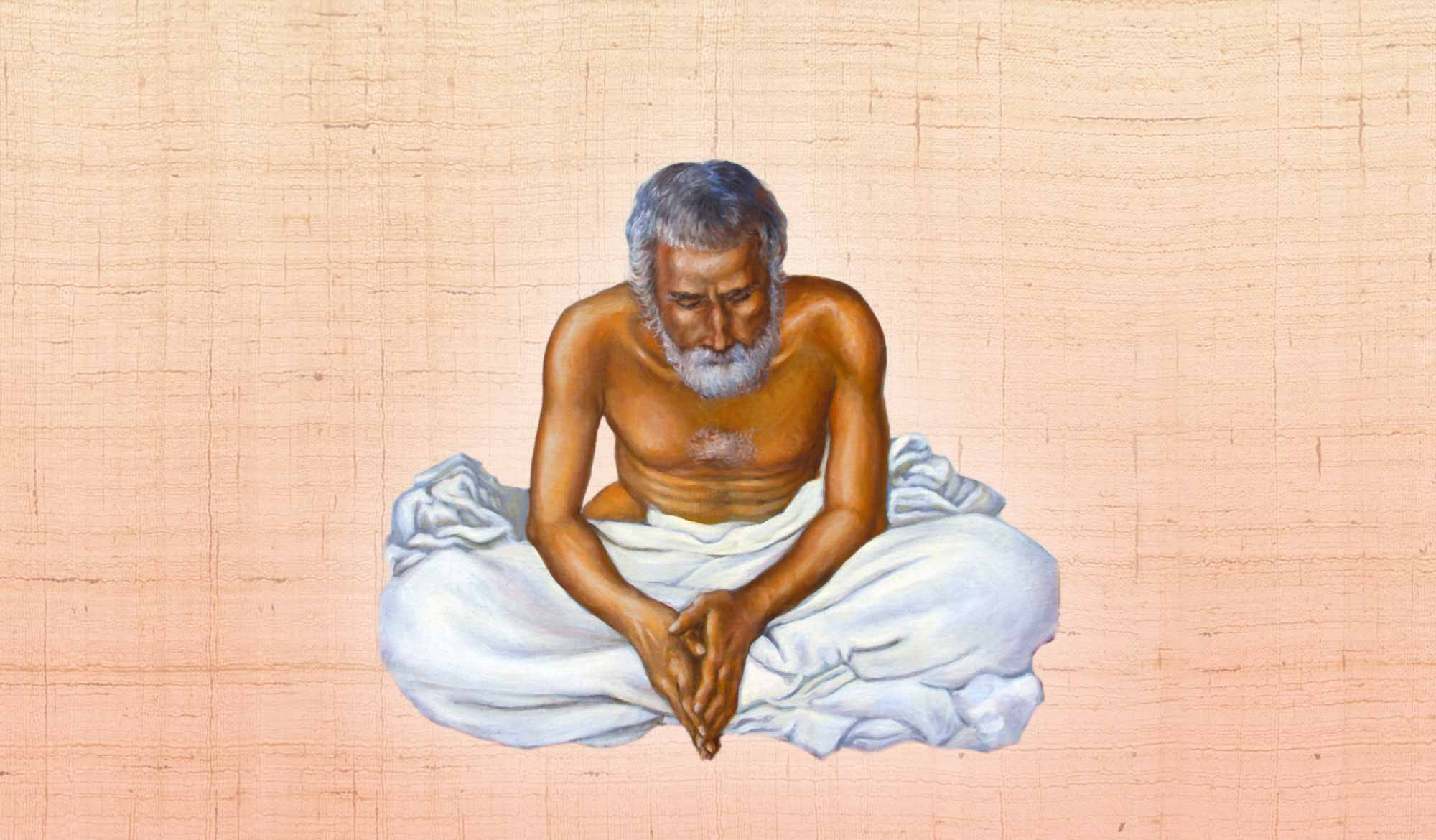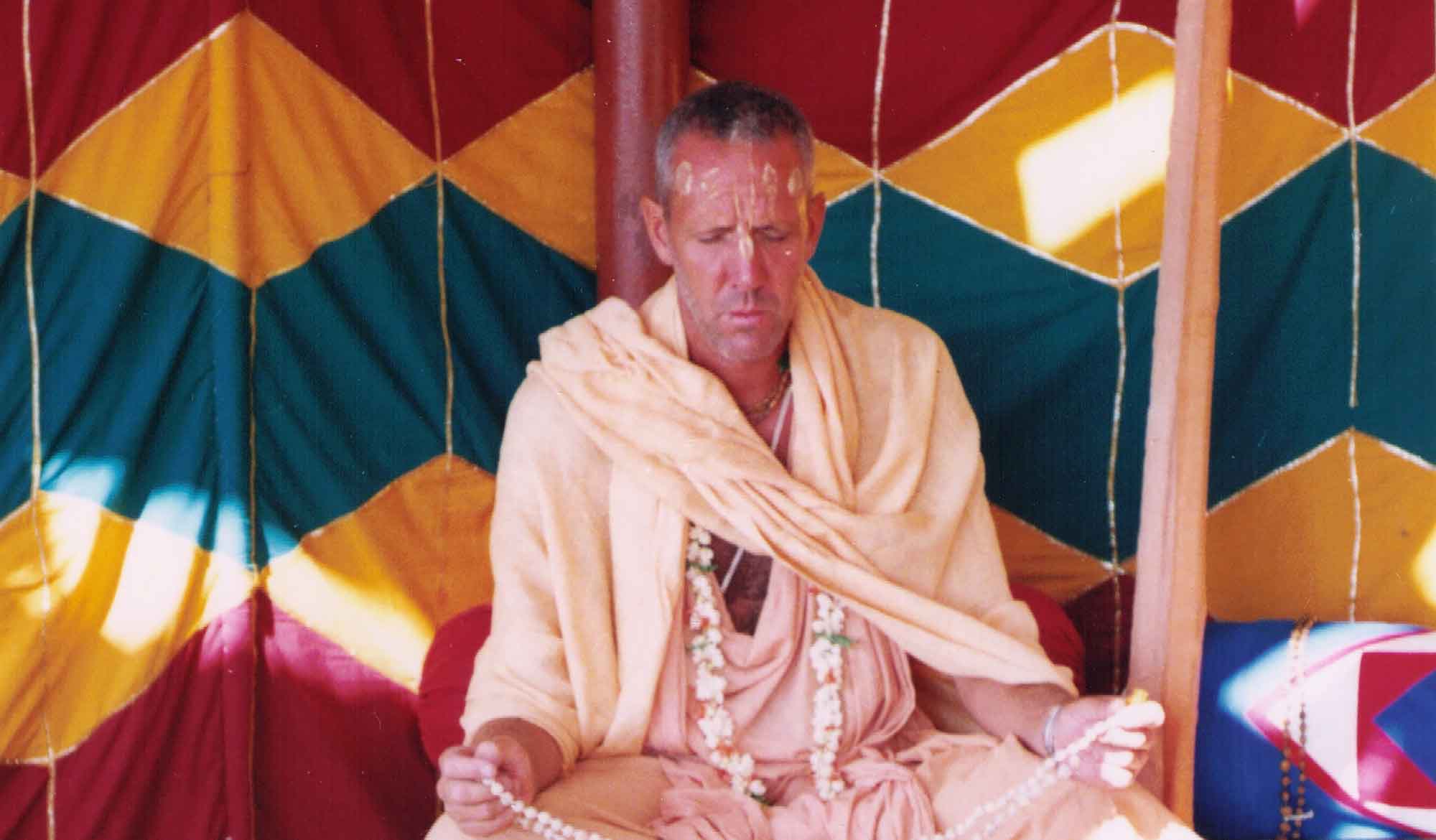by Swami B.G. Narasingha
‘Śrīdhara 'Deva' Gosvāmī’ was written by Swami Narasingha on April 9th 2002. This article was in response to certain Vaiṣṇavas who complained that it was improper to use the title ‘Deva’ in referring to Śrīla Śrīdhara Mahārāja. Narasingha Maharaja gives a detailed answer as to why this title is most appropriate.
Question: There has been some discussion on the use of the honorific title ‘Deva’ as in the name of Śrīla B.R. Śrīdhara Deva Gosvāmī Mahārāja, to the extent that some parties say that it is appropriate, while others say that it is not. Could you please say something that would shed some light on this topic?
Answer: According to the tradition of the Gauḍīya sampradāya we cannot find fault with the honorific title ‘Deva’ as in the case of an extremely advanced and revered Vaiṣṇava such as Śrīla B.R. Śrīdhara Deva Gosvāmī Mahārāja.
The name ‘Śrīla Bhakti Raksaka Śrīdhara Deva Gosvāmī Mahārāja’ was printed on the covers of and in many books of Śrīla Śrīdhara Mahārāja, such as Bhāgavad-gītā, Bhakti-rasāmṛta-sindhu, Śrī Kīrtana Mañjuṣā, Prema-dhāma-deva-stotram, Śrī Guru and His Grace, Search for Śrī Kṛṣṇa, Reality the Beautiful, The Golden Volcano of Divine Love, Loving Search for the Lost Servant, Sermons from the Guardian of Devotion and more. All this was done in the living presence of Śrīla Śrīdhara Mahārāja and was approved by him. To say, as some persons have said, that the suffix ‘Deva’ is an insult to such a great ācārya as Śrīla Śrīdhara Mahārāja has no real basis and is obviously false.
The root of the word deva is diva meaning lustrous or shining brightly. Another meaning is ‘to play or to sport.’ The suffix deva in fact is quite common in the Gauḍīya sampradāya and is used in such names of the Supreme Lord and His devotees as; Govindadeva, Baladeva, Gaurāṅgadeva, Puruṣottamdeva, Śukadeva, and Gurudeva, etc.
As a prefix deva has also been in use among the brāhmaṇa community in India for many centuries to designate a person with divine characteristics – in the case of Śrīla Śrīdhara Mahārāja divine characteristics and especially, divine intelligence. So either as a prefix or a suffix the use of the title deva may be considered appropriate.
Both the Gauḍīya tradition and the Sanskrit rules of grammar harmonise and support the use of the word ‘Deva’ as an honorific title for great Vaiṣṇavas and saintly persons.
Another example of the use of the word ‘Deva’ is found in the guru–praṇāma prayer to our Guru Mahārāja, Śrīla A.C. Bhaktivedanta Svāmī Prabhupāda. There it is written, namaste sārasvate deve. Here the words sarasvatī and deva are joined together under the Sanskrit rule of grammar known as samāsa. Thus deva becomes deve, sarasvatī becomes sarasvate and the first ‘a‘ in sarasvate becomes long. Thus the meaning of namaste sārasvate deve means, ‘I offer my respects unto he who belongs to, or is a servant of ‘Sarasvatī Deva.’
The praṇāma prayer, namaste sārasvate deve was written personally by our Guru Mahārāja for his disciples to chant. So at least for those who profess to be followers of Śrīla A.C. Bhaktivedānta Svāmī Prabhupada, the use of the word ‘Deva’ in glorifying one’s guru may be deemed appropriate.
Some persons may say that ‘Deva’ refers to the Demigods, but to such persons we say, Kṛṣṇa is the ‘Deva’ of such Devas, deva-deva jagat-pate – Kṛṣṇa is the God of gods. Indeed, even the Supreme Lord Himself is known as ‘Deva,’ so how can it be a demeaning title?
In the Kāma Gāyatrī we find, kāma-devāya vidmahe. In the Dāmodara Gāyatrī we find, tanno devaḥ pracodayāt and in the Gadādhara Gāyatrī we also find tanno devaḥ pracodayāt. In each of these instances deva indicates the Supreme Lord or His Internal Energy (as in the case of Gadādhara Paṇḍita).
In caitanya-līlā Gadādhara Paṇḍita represents the guru-tattva for those devotees following in the mādhurya-rasa. This is another bona-fide reason why Śrīla B.R. Śrīdhara Mahārāja may be addressed as ‘Deva’ because he has revealed the hidden treasure of mādhurya-bhāva (parakīya-rasa) in Bhāgavad-gītā (Chapter 10 Verses 9 & 10) and also he has revealed rādhā-dāsyam (the service of Śrī Rādhā) in the heart of Gāyatrī Mantra (Gāyatrī Nigūḍhārtha).
In the Brahma-Gāyatrī we find the words, bhārgo devasya dhīmahi. Śrīla Śrīdhara Mahārāja has given the meaning thus – Bhargo represents mahā–bhāva (Śrīmatī Rādhārāṇī) the predominated Moiety, and deva, Kṛṣṇa, is Rasa-rāja, the predominating Moiety. Deva means ‘who is beautiful and playful,’ that is Kṛṣṇa Reality the Beautiful. He is not a non-differentiated substance, but is full of līlā, pastimes. Deva means pastimes and beauty combined, and this means Kṛṣṇa.
So we may also understand the word ‘Deva’ to mean one who reveals wonderful pastimes of love, that is Kṛṣṇa. Since Śrīla B.R. Śrīdhara Deva Gosvāmī Mahārāja is that divine personality who has revealed the hidden wealth of the Brahma-Gāyatrī, revealing that ultimately Gāyatrī worships Śrīmatī Rādhārāṇī, he is therefore highly qualified to be honoured with the title ‘Deva’. ‘Deva’ means one who manifests pastimes of love to attract the hearts of His pure devotees. The Gāyatrī has sprung from the flute song of Śrī Kṛṣṇa and it is attracting the pure devotees to serve Him in various transcendental moods of loving devotional service.
Śrīla Śrīdhara Deva Gosvāmī Mahārāja is that empowered personality in the Gauḍīya sampradāya who has shown us the hidden most truth in Gāyatrī and connected that to that which lies in the heart of Śrīmad Bhāgavatam, rādhā-dāsyam:
devasyāmṛta-rūpa-līla-rasadherārādha-dhīḥ-preriṇaḥ
devasyāmṛta-rūpa-līla-purṣasy-ārādha-dhī preṣiṇaḥ
devasya-dyuti-sundaraika-puruṣasy-ārādhya-dhī-preṣiṇaḥ
gāyatrī-muralīṣṭa-kīrtana-dhanaṁ rādhā-padaṁ dhīmahi
gāyatrī-gaditaṁ mahāprabhu-mataṁ rādhā-padaṁ dhīmahi
dhīr-ārādhanam eva nānyad-iti-tad-rādhā-padaṁ dhīmahi
The purport of Gāyatrī has never before been so clearly revealed as in the commentary Śrī Gāyatrī Nigūḍhartha‘ by Śrīla B.R. Śrīdhara Deva Gosvāmī Mahārāja. This is the first time such has been fully revealed since the Gauḍīya sampradāya began. Therefore ‘Deva’ (a saintly person) as his title is quite appropriate.
One who is expert in revealing the innermost plane of the domain of the Lords’ confidential pastimes as is condensed in Gāyatrī is certainly worthy of such a title as ‘Deva.’ Not only is his purport of Gāyatrī taking us to the Lord’s līlā, but Śrīla Śrīdhara Mahārāja has also concisely manifest Śrī Caitanya Mahaprabhu’s divine līlā in his Sanskrit composition, Prema-dhāma-deva Stotra.
Śrīla Śrīdhara Mahārāja has begun Prema-dhāma-deva Stotra with the words, deva-siddha-mukta-yukta-bhakta-vṛndā-vanditaṁ and he has sung in each of the seventy verses, prema-dhāma-devam-eva-naumi gaura-sundaram. Śrīla Śrīdhara Mahārāja is therefore recognised as ‘Deva’ because he has expertly sung the glories of the Supreme Lord, the golden avatāra, Śrī Caitanyadeva.
These are a few of the reasons why the title ‘Deva’ is appropriate in the case of Śrīla B.R. Śrīdhara Deva Gosvāmī Mahārāja. However, some obstinate persons may not be satisfied with the above. Therefore, we requested one of our sannyāsīs to go to Navadvīpa-dhāma last week to speak with Śrīpāda Govinda Mahārāja, the successor of Śrīla Śrīdhara Mahārāja at Śrī Caitanya Sārasvata Maṭha and to ask him about the use of ‘Deva’ in Śrīla Śrīdhara Mahārāja’s name. Śrīpāda Govinda Mahārāja commented that in the last years of Śrīla Śrīdhara Mahārāja’s life that he used to sign letters and other papers as “Śrīdhara Deva Gosvāmī.”
So either from the ontological point of view or from the practical point of view, it seems that ‘Deva’ is an appropriate title for Śrīla Śrīdhara Mahārāja, one used and approved by him personally.
We should stop to think for a moment. Who is Śrīla Śrīdhara Mahārāja? What is his position in the Gauḍīya sampradāya? According to those who were advanced disciples of Śrīla Bhaktisiddhānta Sarasvatī Ṭhākura such as Śrīla Bhakti Pramoda Purī Gosvāmī, Śrīla Śrīdhara Mahārāja was the possessor of the divine grace of Paramārādhya Śrī Śrīla Prabhupāda Bhaktisiddhānta Sarasvatī Ṭhākura. In the words of many of his godbrothers, including our Guru Mahārāja, Śrīla A.C. Bhaktivedānta Svāmī Prabhupāda, Śrīla Śrīdhara Mahārāja was their śikṣā-guru. In the words of many he was the Guardian of Devotion and the keeper of life’s ultimate goal, kṛṣṇa-prema. He was considered by many to be the keeper of the Rūpānuga sampradāya, the keeper of the line of Śrī Rūpa Gosvāmī.
In his own words, Śrīla Śrīdhara Mahārāja wrote as follows:
līlā-saṅgopa-kāle nirupadhi-karuṇā-kāriṇā svāmināhaṁ
yat pādābje ’rpito yat pada-bhajanamayaṁ gāyayitvā tu gītam
yogyāyogyatva-bhāvaṁ mama khalu sakalaṁ duṣṭa-buddher agṛhṇan
sa śrī-rūpaḥ kadā māṁ nija-pada-rajasā bhūṣitaṁ saṁvidhatte
“Just prior to the withdrawal of his manifest līlā, my causelessly merciful Divine Master, Śrīla Sarasvatī Ṭhākura, handed me over to the holy feet of that Divine Personality (Śrī Rūpa Gosvāmī) by having me sing the glorious prayer unto his lotus feet (Śrī rūpa-mañjarī-pada). Despite my lowliness, when will I, disregarding all my various qualifications and disqualifications I Śrīmad Rūpa Prabhu grace me with the dust of his holy lotus feet?” (Śrī Prapanna-jīvanāmṛtam, Śrīmad Rūpa-pada-rajaḥ Prārthaṉa Daśakam, verse 10)
More Articles by Swami B.G. Narasingha
Sādhana Bhakti
‘Sādhana Bhakti’ was written by Swami B.G. Narasingha in 1993. In this article, Narasingha Maharaja describes the five main divisions (aṅgas) of sādhana-bhakti as given by Śrīla Rūpa Gosvāmī in his Bhakti-rasāmṛta-sindhu.
Bābājī Sannyāsa
“Bābājī Sannyāsa” written by Śrīla Narasiṅgha Mahārāja in 2002, is in response to questions concerning the awarding of bābājī-veśa in the line of Śrīla Bhaktisiddhānta Sarasvatī Ṭhākura and A.C. Bhaktivedānta Svāmī Prabhupāda.
A Little Distant and Below
‘A Little Distant and Below’ was written by Śrīla B.G. Narasiṅgha Mahārāja in 1996 as a letter to some of his godbrothers and godsisters in his mission. In this letter, Narasiṅgha Mahārāja discusses an article by Śrīla Śrīdhara Mahārāja (‘Fools Rush in Where Angels Fear to Tread’) which explains how higher topics of kṛṣṇa-līlā should be dealt with.

